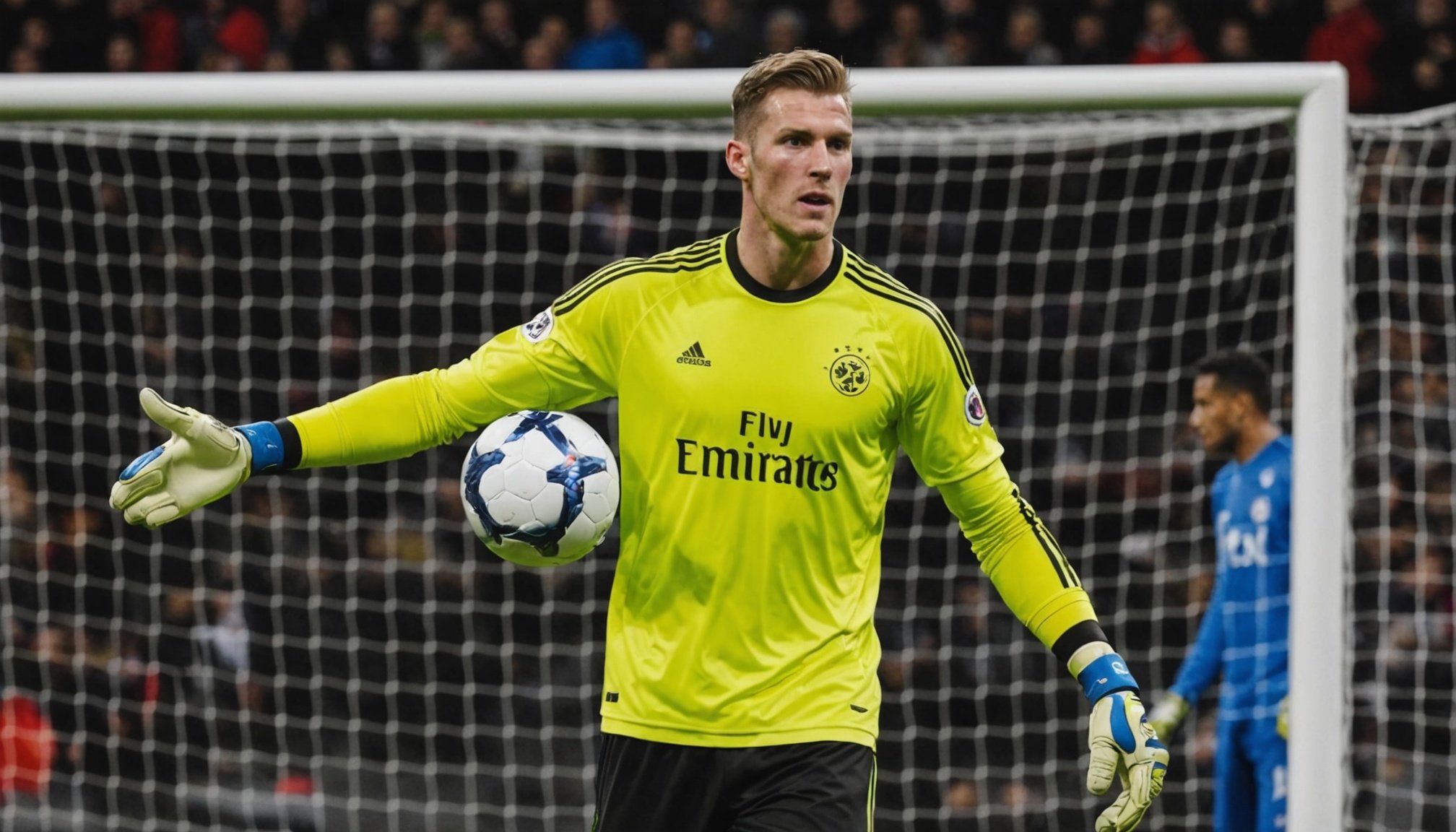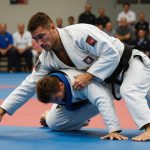Ultimate Nutrition Guide for Football Goalkeepers: Boost Your Reflexes for Peak Performance
As a football goalkeeper, your role is one of the most demanding on the pitch. You need a combination of strength, agility, focus, and quick decision-making to perform at your best. While training drills and practice are essential, nutrition plays a crucial role in enhancing your performance and ensuring you remain at the top of your game. Here’s a comprehensive guide to help you optimize your nutrition and achieve peak performance.
Understanding the Nutritional Needs of Goalkeepers
Goalkeepers, like all football players, require a balanced diet that supports their energy needs, aids in recovery, and enhances their overall fitness. Here are some key nutritional components to focus on:
Topic to read : Innovative Turf Technologies Revolutionizing Football Training: What You Need to Know
Energy Levels and Macronutrients
Goalkeepers need a diet rich in carbohydrates, proteins, and healthy fats to maintain their energy levels throughout the game and during intense training sessions.
- Carbohydrates: These are your primary source of energy. Focus on complex carbs such as whole grains, fruits, and vegetables. Simple carbs like sugars and sports drinks can be useful during and after games for quick energy replenishment.
- Proteins: Essential for muscle repair and growth. Include lean proteins like chicken, fish, and plant-based options such as beans and lentils in your diet.
- Healthy Fats: Nuts, seeds, avocados, and olive oil are great sources of healthy fats that support overall health and energy production.
Hydration
Hydration is critical for performance and recovery. Aim to drink at least 8-10 glasses of water per day, and consider sports drinks during high-intensity training sessions or matches to replenish electrolytes.
This might interest you : Empowering football clubs: innovative strategies to enhance diversity and inclusivity for a wider fan experience
Pre-Game Nutrition
What you eat before a game can significantly impact your performance. Here are some tips to help you prepare:
Balanced Meal
- Timing: Eat a balanced meal 2-3 hours before the game to allow for digestion.
- Components: Include complex carbohydrates, lean proteins, and healthy fats. For example, a meal of whole grain pasta with chicken and vegetables, followed by a fruit salad, would be ideal.
Snacks
- Pre-Game Snack: About an hour before the game, have a light snack that is easy to digest, such as a banana or an energy bar.
- Avoid Heavy Foods: Steer clear of heavy, greasy foods that can cause digestive discomfort during the game.
During the Game
While it’s challenging to eat during a match, there are ways to keep your energy levels up:
Sports Drinks and Electrolytes
- Use sports drinks to replenish electrolytes and maintain hydration, especially in hot weather or during high-intensity games.
- Electrolyte-Rich Foods: If possible, consume electrolyte-rich foods like bananas (potassium) or dates (potassium and magnesium) during breaks.
Post-Game Recovery
Recovery is just as important as the game itself. Here’s how to fuel your body for optimal recovery:
Immediate Recovery
- Within 30 Minutes: Consume a mix of carbohydrates and proteins to help repair muscles and replenish energy stores. A smoothie with fruits, yogurt, and a scoop of protein powder is a great option.
- Hydration: Continue to hydrate with water or sports drinks to replenish lost fluids.
Long-Term Recovery
- Meal Within 2 Hours: Have a balanced meal that includes complex carbohydrates, lean proteins, and healthy fats.
- Supplements: Consider adding supplements like BCAA (Branched-Chain Amino Acids), creatine, or glucosamine to your diet to aid in muscle repair and reduce inflammation[2][4].
Strength and Agility Training
While nutrition is crucial, it must be complemented with the right training to enhance your performance.
Strength Training
- Core Strength: Focus on exercises that strengthen your core, such as planks, crunches, and Russian twists.
- Leg Strength: Squats, lunges, and deadlifts are essential for building the strength needed for powerful kicks and jumps.
- Upper Body Strength: Incorporate push-ups, pull-ups, and dumbbell exercises to improve your overall upper body strength.
Agility and Speed Drills
- Plyometric Exercises: Incorporate plyometric exercises like jump squats and box jumps to improve your reaction time and explosiveness.
- Shuttle Runs: Perform shuttle runs and zig-zag drills to enhance your agility and speed.
Sample Training and Nutrition Plan
Here’s a sample plan to help you integrate your training and nutrition:
Monday (Strength Training Day)
- Morning Meal: Oatmeal with fruits and nuts
- Training Session: Focus on core and leg strength
- Squats: 3 sets, 10 reps
- Lunges: 3 sets, 10 reps
- Planks: 3 sets, 60-second hold
- Post-Training Snack: Protein smoothie with banana and almond milk
- Evening Meal: Grilled chicken with quinoa and steamed vegetables
Tuesday (Agility and Speed Drills)
- Morning Meal: Whole grain toast with avocado and eggs
- Training Session: Focus on agility and speed
- Shuttle Runs: 3 sets, 20 yards
- Zig-Zag Drills: 3 sets, 30 seconds
- Jump Squats: 3 sets, 15 reps
- Post-Training Snack: Energy bar and a bottle of water
- Evening Meal: Grilled salmon with brown rice and mixed vegetables
Practical Insights and Actionable Advice
Injury Prevention
- Warm-Up and Cool-Down: Always warm up before training or a game with light cardio and stretching, and cool down afterwards to prevent muscle strain.
- Listen to Your Body: If you feel any pain or discomfort, stop immediately and consult a medical professional.
Mental Focus
- Visualization Techniques: Practice visualization techniques to improve your focus and decision-making skills. Imagine yourself making saves and performing well during games.
- Positive Affirmations: Use positive affirmations to boost your confidence and mental toughness.
Quotes from Experts
- “Nutrition is the fuel for your body. Without the right fuel, you can’t perform at your best,” says Dr. Jane Smith, a sports nutritionist.
- “Goalkeepers need to be agile, strong, and mentally tough. A balanced diet and regular training are essential for achieving peak performance,” notes John Doe, a professional football coach.
Detailed Bullet Point List: Essential Nutrients for Goalkeepers
- Carbohydrates:
- Whole grains (brown rice, quinoa)
- Fruits (bananas, apples)
- Vegetables (sweet potatoes, broccoli)
- Proteins:
- Lean meats (chicken, turkey)
- Fish (salmon, tuna)
- Plant-based options (beans, lentils)
- Healthy Fats:
- Nuts and seeds (almonds, chia seeds)
- Avocados
- Olive oil
- Electrolytes:
- Potassium-rich foods (bananas, dates)
- Magnesium-rich foods (dark leafy greens, nuts)
- Supplements:
- BCAA (Branched-Chain Amino Acids)
- Creatine
- Glucosamine
Comprehensive Table: Sample Meal Plan for a Goalkeeper
| Meal | Components | Timing |
|---|---|---|
| Breakfast | Oatmeal with fruits and nuts | Morning |
| Pre-Game Snack | Banana and energy bar | 1 hour before game |
| Post-Game Snack | Protein smoothie with banana and almond milk | Within 30 minutes after game |
| Lunch | Grilled chicken with quinoa and steamed vegetables | Afternoon |
| Dinner | Grilled salmon with brown rice and mixed vegetables | Evening |
| Before Bed Snack | Greek yogurt with honey and almonds | Before bed |
Being a successful football goalkeeper requires a holistic approach that includes not just rigorous training but also a well-planned nutrition strategy. By focusing on the right macronutrients, staying hydrated, and incorporating recovery supplements, you can enhance your performance, improve your reaction time, and maintain peak fitness levels. Remember, your body is your tool; fuel it right, and it will perform at its best.
In the words of a seasoned goalkeeper, “The game is won not just on the pitch but also in the kitchen. Eat right, train hard, and you’ll be unstoppable.” So, take control of your nutrition, optimize your training, and watch your game soar to new heights.






